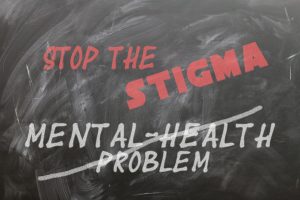
Picking wild blueberries on the hike before the whining started. “I’m tired. My feet hurt. I don’t want to walk anymore and it’s really hot. I need to stop and rest. Can you carry me? Why can’t you carry me?” In her defense, my 8 year old made it all
Read More
 Shared by Carla Naumburg, Ph.D, Contributing Blogger August 2, 2018
Shared by Carla Naumburg, Ph.D, Contributing Blogger August 2, 2018

When your spouse has depression, you might be very worried, and feel utterly helpless. After all, depression is a stubborn, difficult illness. Your partner might seem detached or deeply sad. They might seem hopeless and have a hard time getting out of bed. They might be irritable with a swiftly
Read More
 Shared by Margarita Tartakovsky, M.S., Contributing Blogger August 1, 2018
Shared by Margarita Tartakovsky, M.S., Contributing Blogger August 1, 2018

When someone outside of therapy learns that Panthea Saidipour is a psychoanalytic psychotherapist, their first question is usually: “Are you analyzing me right now?” Saidipour jokingly responds they shouldn’t worry because she’s off the clock. But this question actually reveals a common concern clients have, whether they mention it aloud
Read More
 Shared by Margarita Tartakovsky, M.S., Contributing Blogger July 29, 2018
Shared by Margarita Tartakovsky, M.S., Contributing Blogger July 29, 2018

We think of boundaries as keeping us away from our spouses, as creating distance, as thinning and weakening our bond. But boundaries—healthy boundaries—can actually strengthen our connection and bolster our relationship with our partner. For instance, when you set a boundary that creates space for both partners to focus on
Read More
 Shared by Margarita Tartakovsky, M.S., Contributing Blogger July 13, 2018
Shared by Margarita Tartakovsky, M.S., Contributing Blogger July 13, 2018

Working with a credentialed, experienced ADHD coach is critical for helping individuals with ADHD achieve their goals, capitalize on their strengths and build a fulfilling life. And like any important endeavor, this requires effort and hard work. For instance, ADHD coaching is highly active and collaborative. It requires that clients
Read More
 Shared by Margarita Tartakovsky, M.S., Contributing Blogger July 7, 2018
Shared by Margarita Tartakovsky, M.S., Contributing Blogger July 7, 2018

When therapist Colleen King was 19 years old, a psychiatrist told her that because of her family history—her father and brother having bipolar disorder—she shouldn’t have children. Today, King’s clients regularly tell her that people have told them they shouldn’t or can’t have loving relationships. Sadly, these are just two
Read More
 Shared by Margarita Tartakovsky, M.S., Contributing Blogger July 1, 2018
Shared by Margarita Tartakovsky, M.S., Contributing Blogger July 1, 2018

Managing our emotions revolves around four components: • 1 Expressing ourself • 2 Taking care of ourself • 3 Building up our tolerance for frustration • 4 Maintaining a positive outlook EXPRESSING OURSELF Most of us have heard the expression that communication is 10 percent information and 90 percent emotion.
Read More
 Shared by Aaron Karmin, LCPC, Contributing Blogger June 27, 2018
Shared by Aaron Karmin, LCPC, Contributing Blogger June 27, 2018

There are four reasons we get angry: • 1 Seeking revenge. We feel hurt, so we use anger to get even and make things fair. • 2 Preventing disaster. We feel worried, so we use anger to attack others to get control. • 3 Pushing others away. We feel sad,
Read More
 Shared by Aaron Karmin, LCPC, Contributing Blogger June 27, 2018
Shared by Aaron Karmin, LCPC, Contributing Blogger June 27, 2018

Many of us perceive ourself as being at the center of the world. This attitude is called egocentrism. As a consequence of this naive, self-centered perspective, we mistakenly conclude that we are somehow responsible for everything that happens in the world. We feel accountable for all the bad things that happen
Read More
 Shared by Aaron Karmin, LCPC, Contributing Blogger June 27, 2018
Shared by Aaron Karmin, LCPC, Contributing Blogger June 27, 2018

Some of us feel terribly out of control when others are unable to “explain” events to our satisfaction. When we are unable to come up with an acceptable solution to a problem, we are often left focusing on who is at fault. It is like having an open wound. It
Read More
 Shared by Aaron Karmin, LCPC, Contributing Blogger June 27, 2018
Shared by Aaron Karmin, LCPC, Contributing Blogger June 27, 2018
![]() Shared by Carla Naumburg, Ph.D, Contributing Blogger August 2, 2018
Shared by Carla Naumburg, Ph.D, Contributing Blogger August 2, 2018








